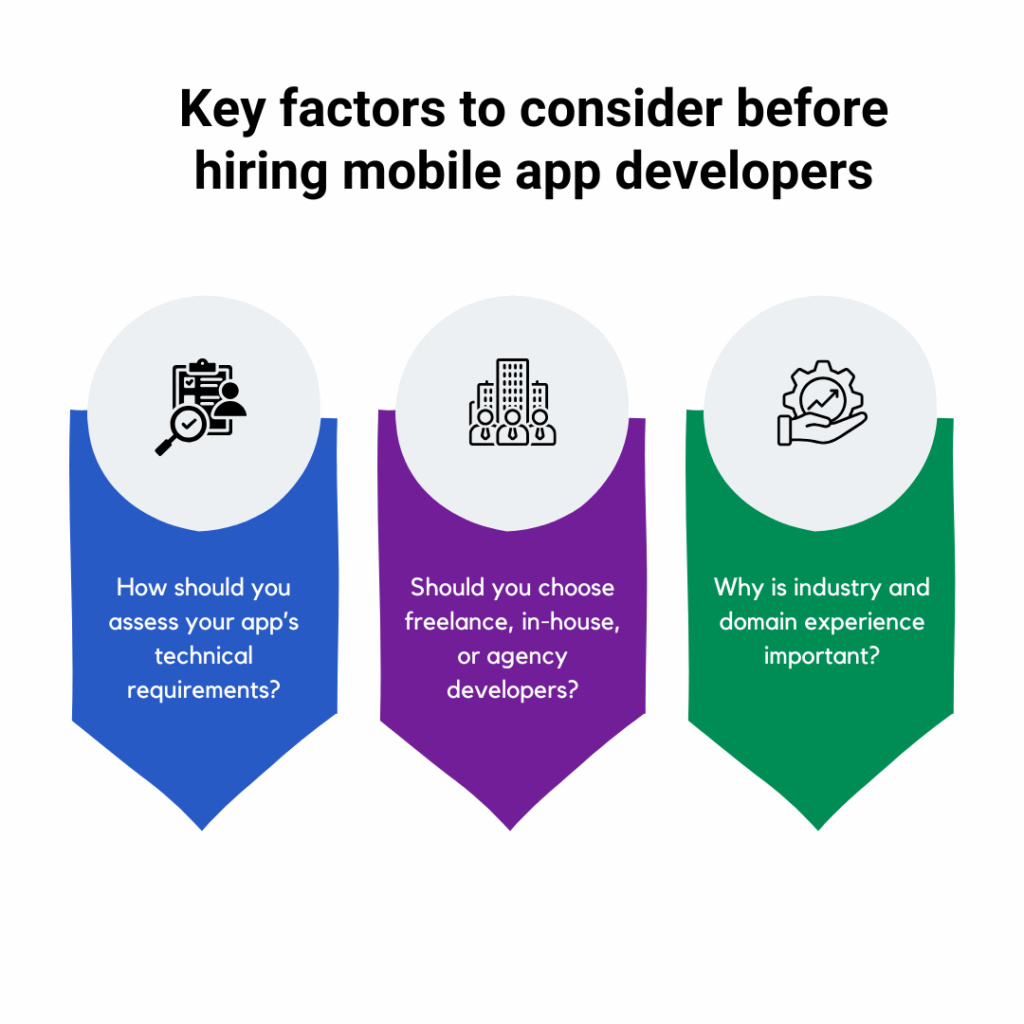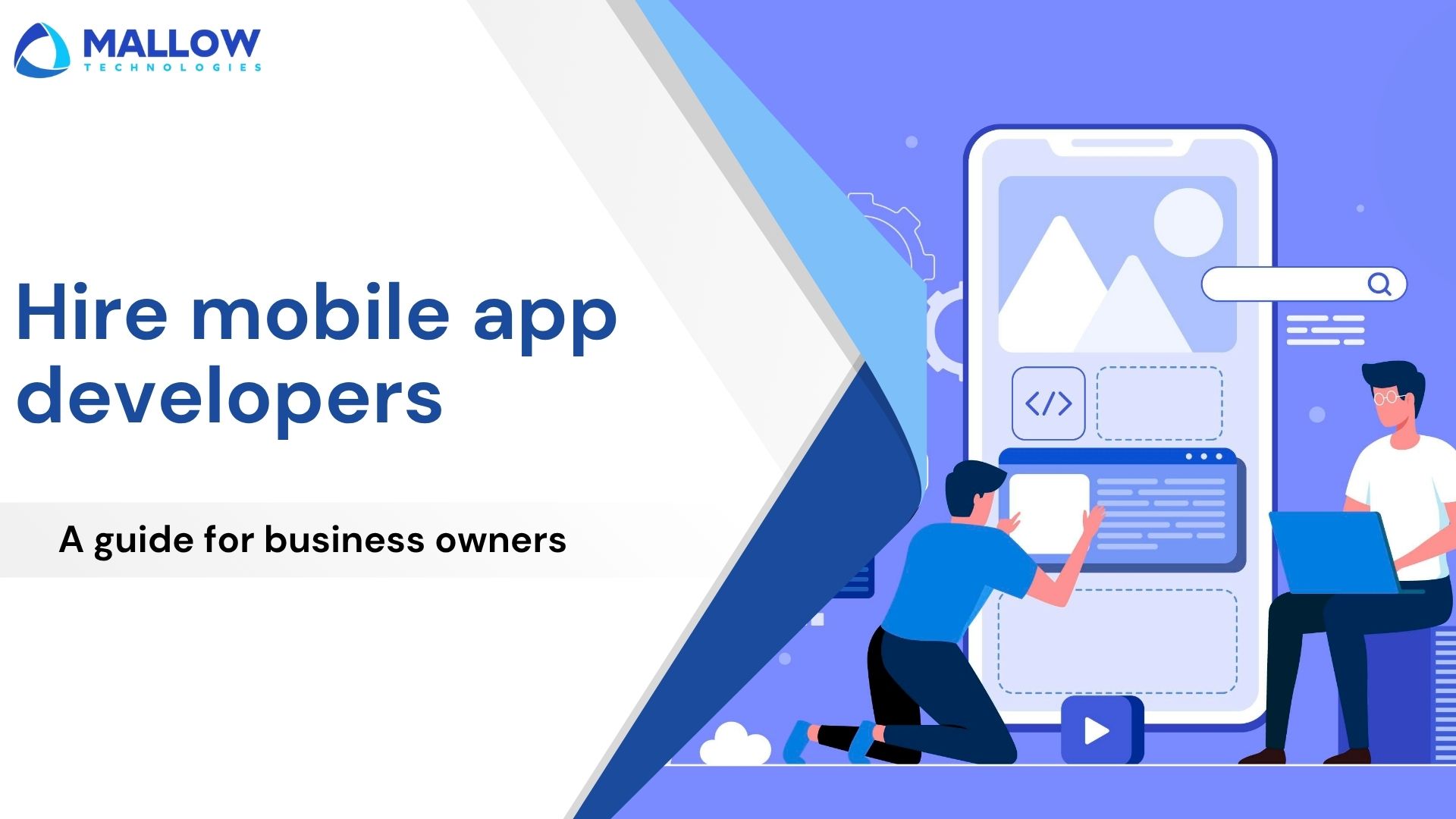Many business owners struggle with uncertainty when it comes to evaluating developer expertise. Budget constraints and vague cost estimates only add to the confusion, making it harder to make informed decisions. There’s also the risk of delayed time-to-market, which can impact competitiveness. For those with existing apps, finding developers who understand legacy codebases and can manage updates without disruption becomes a major concern. On top of that, fears around poor communication and lack of project transparency can make the entire hiring process feel risky and overwhelming.
With a proven track record of delivering mobile app projects across various industries, we align every solution with real business goals. Our deep expertise across platforms like iOS, Android, React Native, and Flutter allows us to recommend the most effective tech stack for your needs. We’re skilled at evaluating and managing both in-house and remote developer teams, ensuring the right talent fit and sustained productivity. Through transparent communication and agile project management, we keep your mobile app development on track and within budget with the help of our expert mobile app developers. Our commitment doesn’t end at launch, we provide ongoing support to ensure your app stays scalable, secure, and high-performing over time.
This article will help you confidently navigate the process of hiring mobile app developers by breaking down the key factors to consider before making a decision. You’ll learn how to effectively evaluate a developer’s skills and experience, choose the right hiring approach for your project, and avoid common hiring mistakes. Along the way, we’ll also share practical tips on how to manage your developers to ensure a smooth, successful outcome that meets your business goals.
Why hiring the right mobile app developers matters for your business?
How do developer skills impact app quality and user experience?
The expertise of your mobile app developers directly influences the quality and user experience (UX) of your application. Skilled developers ensure that the app is not only functional but also intuitive, responsive, and engaging. A well-designed UX leads to higher user satisfaction, increased retention rates, and positive reviews, which are crucial for the app’s success.
What are the risks of hiring the wrong developers?
Hiring developers without the necessary skills or experience can lead to significant setbacks. Common issues include delayed project timelines, increased costs due to rework, and a final product that doesn’t meet business objectives.
How can developer expertise align with business goals?
Aligning developer expertise with your business goals ensures that the app supports your strategic objectives. Developers who understand your industry can make informed decisions that enhance the app’s relevance and effectiveness.
What are the key factors to consider before hiring mobile app developers?

How should you assess your app’s technical requirements?
Before hiring developers, it’s essential to have a clear understanding of your app’s technical requirements. This includes defining the app’s core functionalities, target platforms (iOS, Android, or both), and any integration needs with existing systems.
Should you choose freelance, in-house, or agency developers?
The choice between freelance, in-house, or agency developers depends on your project’s scope, budget, and timeline. Freelancers can be cost-effective for smaller projects but may lack the resources for larger, more complex apps. In-house teams offer better control and collaboration but come with higher overhead costs. Agencies provide a balance, offering a team of experts and structured processes.
Why is industry and domain experience important?
Hiring developers with experience in your specific industry ensures they understand the unique challenges and requirements of your business. Such developers can anticipate potential issues and design solutions that are tailored to your market. Techstack highlights that a good development partner won’t just offer technical skills; they’ll be familiar with your industry-specific requirements, too.
How to evaluate mobile app developers effectively?
How can you assess technical skills and portfolio quality?
Evaluating a developer’s technical skills and portfolio is crucial to ensure they can meet your project’s requirements. Start by reviewing their portfolio for diversity in projects, quality of design, and user experience. A diverse portfolio indicates versatility and adaptability to different project needs. Pay attention to the technologies and frameworks they’ve used, as this showcases their technical proficiency.
Why are communication and project management skills important?
Effective communication and project management are vital for the success of any mobile app development project. Developers should be able to clearly articulate ideas, provide regular updates, and manage tasks efficiently. Strong project management ensures that the project stays on track, within budget, and meets deadlines. Moreover, tools like Atlassian’s Jira empower teams to manage timelines and sprints effectively – so check if your developer is proficient in such platforms, which improve visibility and accountability throughout the project lifecycle.
How do references and client testimonials help in evaluation?
Checking references and client testimonials provides firsthand insights into a developer’s reliability, work quality, and professionalism. Reach out to previous clients to understand their experience, focusing on aspects like adherence to deadlines, problem-solving abilities, and communication skills.
Best practices for hiring mobile app developers
How do you write clear and detailed job descriptions?
Crafting a clear and detailed job description is essential to attract the right candidates. Clearly outline the project scope, required skills, experience level, and responsibilities. Specify the technologies and platforms involved and highlight any industry-specific requirements. Toptal emphasizes the importance of specifying the technology stack and being clear about the expectations to ensure you attract suitable candidates.
What is the importance of structured interviews and practical tests?
Conducting structured interviews and practical tests allows you to objectively assess a candidate’s skills and suitability for your project. Structured interviews involve asking all candidates the same set of questions, enabling fair comparisons. Practical tests, such as coding challenges or problem-solving tasks, provide insights into a developer’s technical abilities and approach to real-world scenarios.
How do you set realistic timelines and budget expectations?
Setting realistic timelines and budget expectations is crucial for the smooth execution of your app development project. Begin by clearly defining the project scope and requirements. Discuss these with your development team to get accurate estimates. Regularly review progress and be open to adjustments as needed.
What are the common challenges when hiring mobile app developers, and how can you avoid them?
How can you handle scope creep and changing requirements?
Scope creep – when unplanned features or changes are introduced mid-development – can derail budgets, delay timelines, and dilute focus. For business owners, this often stems from a lack of clear requirements or constant changes driven by evolving ideas. To prevent this, define a detailed scope upfront and prioritize features based on business value. Use change request protocols for any additions.
How do you mitigate risks of miscommunication and cultural gaps?
Remote or offshore app development often brings productivity hurdles caused by time zone differences, work style mismatches, or language barriers. As per Harvard Business Review’s guide to managing cross-cultural teams, lack of shared norms and unclear communication leads to tension and poor performance. To avoid this, use collaboration platforms like Slack or Trello to foster transparency and team alignment. Setting expectations early, scheduling regular check-ins, and clearly defining deliverables helps maintain synergy across borders.
How can you avoid hidden costs and unclear contracts?
Unexpected costs can arise from vague contracts, undefined support terms, or extra charges for revisions. To avoid this, ensure your agreement includes detailed deliverables, timelines, maintenance terms, and ownership rights. Always clarify what is included under each phase of work and what counts as “extra.”
How to manage and collaborate with mobile App developers for successful delivery?
Why is establishing clear communication channels crucial?
Reliable communication channels prevent misunderstandings and delays. Platforms like Slack, Microsoft Teams, or Basecamp provide centralized spaces for updates, file sharing, and quick problem-solving. According to a McKinsey & Company report on the social economy, teams that use effective communication and collaboration tools can boost productivity by up to 20%.
How can agile methodologies help ensure iterative progress?
Agile methods empower business owners to stay involved throughout the development process. Instead of waiting for the final delivery, Agile splits development into short sprints where incremental features are reviewed and tested. This approach allows feedback to be implemented continuously and avoids costly changes later.
Why set up milestone-based payments and reviews?
Paying developers based on milestone completion aligns incentives and builds accountability. Rather than committing to a lump sum upfront, tie payments to deliverables such as wireframes, MVP launch, and final app submission. This model provides better control and ensures that both parties remain aligned on expectations.
How much does it cost to develop a mobile application?
Hiring the right mobile app developers is more than just filling a role, it’s about aligning technical expertise with your business vision to build an app that delivers real value. Now that you’ve gained clarity on what to look for, how to evaluate talent, and how to avoid common hiring mistakes, you’re better equipped to make informed decisions that drive successful outcomes.
If you’re struggling to find reliable developers, concerned about escalating costs, or unsure how to evaluate technical fit for your app idea or existing product, you’re not alone. These are common challenges we help business owners navigate every day—with clarity, transparency, and proven development expertise.
To move forward confidently, your next step should be understanding the financial aspect of your app journey. Our article on How much does it cost to develop a mobile application: Factors & budgeting dives into the critical cost components and budgeting tips. Whether you’re building from scratch or scaling an existing app, you’ll walk away with actionable insights to help plan your investment wisely.
Still unsure about your next step? Feel free to get in touch with our team. At Mallow, we’ve helped businesses across industries hire the right developers, streamline their app development process, and launch apps that perform—on time and within budget.
What happens after you fill-up the form?
Request a consultation
By completely filling out the form, you'll be able to book a meeting at a time that suits you. After booking the meeting, you'll receive two emails - a booking confirmation email and an email from the member of our team you'll be meeting that will help you prepare for the call.
Speak with our experts
During the consultation, we will listen to your questions and challenges, and provide personalised guidance and actionable recommendations to address your specific needs.
Author
SathishPrabhu
Sathish is an accomplished Project Manager at Mallow, leveraging his exceptional business analysis skills to drive success. With over 8 years of experience in the field, he brings a wealth of expertise to his role, consistently delivering outstanding results. Known for his meticulous attention to detail and strategic thinking, Sathish has successfully spearheaded numerous projects, ensuring timely completion and exceeding client expectations. Outside of work, he cherishes his time with family, often seen embarking on exciting travels together.



